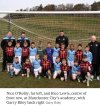You are using an out of date browser. It may not display this or other websites correctly.
You should upgrade or use an alternative browser.
You should upgrade or use an alternative browser.
33 | Nico O'Reilly - 2025/26
- Thread starter MCFC1993
- Start date
BringBackSwales
Well-Known Member
- Joined
- 3 Jul 2009
- Messages
- 37,346
I don’t think Zinchenko gets regular game time if he was with us, imho. Agree about Nico and he’s only 20Talking from his point of view.
Fair play to O’Reilly though. Feel like he’s already better than all the other converted full backs we’ve had.
HelloCity
Well-Known Member
I don’t think Zinchenko gets regular game time if he was with us, imho. Agree about Nico and he’s only 20
He hasn’t since he’s left - that’s the point.
He might well have played more games for City overall than he did Arsenal plus he’d have won the treble.
Some just don't get it...
Go to 12:20 ish.
I listened to Guardian Football Weekly, Football Ramble and Totally Footballs coverage of the game and they all only had good things to say about us and Nico in particular so I guess it’s inevitable that someone’s going to go against the consensus.
BringBackSwales
Well-Known Member
- Joined
- 3 Jul 2009
- Messages
- 37,346
He’s out injured at Forest so I assume he’d be playing more otherwiseHe hasn’t since he’s left - that’s the point.
He might well have played more games for City overall than he did Arsenal plus he’d have won the treble.
jaiguruKun
Well-Known Member
- Joined
- 3 Mar 2011
- Messages
- 6,622
Fuck that didn’t we get £50m for that squad player?
£32m...great deal for Arsenal that
pride in battle
Well-Known Member
I think that was just fatigue, as his body gets used to the demands he will be firing them in !Really impressive. Just wish he was a bit calmer with his finishing at times but that will come no doubt.
We might currently have the best FBs in the league, despite neither really being a FB!
Gray
Well-Known Member
- Joined
- 30 May 2004
- Messages
- 28,815
- Team supported
- ABU & The Bus Wreckers
Love this lad he is a very exciting prospect.
David Silva
Well-Known Member
- Joined
- 24 Jun 2010
- Messages
- 1,153
Both O'Reilly and Doku didn't start vs Spurs, Brighton and Villa: our 3 league losses so far.
Dias and Gvardiol didn't start as a CB combo in these games either.
Nunes , Dias, Gvardiol, O’Reilly as a back four brought about our uptick in form at the end of last season too.
richards30
Well-Known Member
- Joined
- 20 May 2009
- Messages
- 31,908
Starting LB which is testament to how well he’s done and I am a huge Ait Nouri fan!
thomas1307
Well-Known Member
- Joined
- 21 Nov 2024
- Messages
- 518
- Team supported
- manchester city
spent years crying out for lb to finally buy one and an academy player takes his place so happy for himStarting LB which is testament to how well he’s done and I am a huge Ait Nouri fan!
And Donnarumma started only the Villa game among those 3 games.Both O'Reilly and Doku didn't start vs Spurs, Brighton and Villa: our 3 league losses so far.
Dias and Gvardiol didn't start as a CB combo in these games either.
BlueInsomniac
Well-Known Member
- Joined
- 19 Sep 2023
- Messages
- 993
 The making of Nico O’Reilly,as told by his mum and those who discovered him:
The making of Nico O’Reilly,as told by his mum and those who discovered him:
It was when her son was just a few months old that Holli O’Reilly had a strange, almost indescribable feeling — mother’s intuition, if you like — that she decided to share with the boy’s grandmother.“I just had this feeling,” she says. “He was on my knee, three months old, and I remember saying, ‘He’s special’. My mum laughed at me. ‘Holli,’ she said, ‘Everyone thinks their kids are special.’ But I truly believe it was that (mother’s intuition). I just knew he’d go far.”
Twenty years on, that conversation comes to mind now her son, Nico, has Pep Guardiola blowing kisses from the touchline and Thomas Tuchel redefining his England plans for next year’s World Cup.
O’Reilly has just marked Mohamed Salah to the edges of the game — Manchester City versus Liverpool — that has come to be known as the showpiece event of English football.
His form on the left side of City’s defence makes it likely he will win his first senior cap for England later this week, either against Serbia on Thursday or Albania three days later. Chants of “Nico, Nico” were loud and clear during City’s 3-0 win over Liverpool. And, though there is no data available for mother’s intuition, perhaps Holli was right, after all.
“I always knew he’d do it,” she says. “I believed in it so much. And so did he. It’s the best thing in the world to watch him play football. But every so often, I realise what he’s done and I have a breathtaking moment when the emotion gets to me. It happened against Liverpool. I carry all that emotion for him and, at the start of the game, I was trying to hold my tears back.”
Garry Riley has never forgotten the first time he clapped eyes on the schoolboy footballer who, all these years later, is vying to become England’s first-choice left-back.
Riley, a renowned talent-spotter in Manchester football circles, had gone to watch a six-year-old O’Reilly on the recommendation of a colleague, Joe Yates, in City’s scouting system.
“As soon as I saw Nico, I could tell he was a talent,” says Riley. “He played with his head up and had that lovely left foot. Left-footers always stand out, don’t they? It didn’t need long to realise: ‘Yep, he’s got to come with us.’”
What he found out was that O’Reilly was living with Holli on an estate on the border of Ancoats and Collyhurst, within walking distance of Manchester city centre. O’Reilly went to the same Collyhurst primary school, St Patrick’s, attended by Brian Kidd and Nobby Stiles, two of Manchester’s favourite football sons.
As for Ancoats, that whole area has burst into life in recent years, with new apartment blocks rising to the skies and trendy eateries opening up. But Nico and his sister, Nixie Bleu, were brought up there before the gentrification started.
“We’re just ordinary humble people,” says Holli. “We loved it there, and still do. You’ve got to stay humble and grateful, and we live by that.”
The young Nico played for two junior teams, Moston Tigers and Failsworth Dynamos, and because their games were often at different times, his regular Saturday routine was to play in one, get changed as quickly as possible, then head off for wherever his other team had a match.
Often, he would end the day by playing with his school friends on a grassy area that has now been built over for housing. Then, on Sundays, he would report for training with City’s academy.

“He was a great footballer but an even better human being,” says Carl Dillon, who set up Moston Tigers in memory of his father, Patrick, in 2011.
“We got to the final of one tournament and I remember saying to the boys, bearing in mind they were only six years old, that I always felt nervous before a final.
“I could see Nico looking at me. ‘Do you really get nervous?’ he wanted to know. ‘Don’t be nervous, Carl.’
“He got the ball from the kick-off, ran past everybody and scored a brilliant goal. Then he ran over to me: ‘Carl, do you feel a bit better now?’ It wasn’t in a cocky, arrogant way. It was just because he was concerned that I was worried about the game. That tells you about the person he is.”
Dillon, a former scout for City and Everton, recalls O’Reilly being a “grounded kid, no edge to him whatsoever and, even now, no kind of ‘I’m this, I’m that’ attitude. If anything, he’s quite shy and maybe even a bit embarrassed about his new fame. He’s just a lovely, genuine lad.”
Consider the story, for example, about the time Moston Tigers were invited to Merseyside to take on Liverpool’s academy boys.
“One of the other players wasn’t doing so well and got a bit upset,” says Dillon. “The boy started crying. I will never forget Nico, seven years old, going over to him. ‘Listen, we’re all as good as each other,’ he said. ‘You’ll be OK. And I think you’re doing brilliant anyway.’ Little things like that stick in your mind.”
Even as a young boy, O’Reilly used to display the “massive winning mentality” — his mother’s description — that was evident again, at Salah’s expense, during Sunday’s City-Liverpool showdown.
“When he plays against these big players — the players who deserve everything they get, and the names they have for themselves, because they have already proven themselves — it’s a challenge for him,” says Holli. “But he thrives off that challenge.”
Another story goes back to the time Moston were invited to take on City’s academy boys and O’Reilly had to pick who he wanted to play for. He chose Moston, because they were the team where he started.
“He’s a loyal lad,” says Dillon, laughing at the memory. “So he turned up with us and you could hear all the City players going, ‘Oh no…’.”
Word was getting out that a special talent was potentially available. Manchester United invited O’Reilly for a tour of their facilities. Liverpool and Everton had scouts watching him and the problem for City was that, until boys signed for professional clubs at under-nine level, they were free to train with any club in their catchment area.
This is when the role of a football scout morphs into being a club ambassador, too. And Riley, operating on City’s behalf, knew it was his job to make a positive impression.
“You make the parents feel welcome, you invite them into the training complex and introduce them to the coaches,” he says. “It helped that Nico was a City fan but we knew with a boy of his talent there was a risk that United, or somebody else, would try to beat us to him.”
O’Reilly spent time in United’s junior system, as well as with both Merseyside clubs, but he chose City, in his own words, because “the training was a lot better”.
He was still at primary school when Guardiola arrived in 2016 and, at that age, even the most experienced coach cannot say for certain whether all that rich potential will fully flower.
Even then, however, the youngster’s talent was obvious — in City’s under-10s and under-11s, he won back-to-back Premier League national championships while being named player of the tournament.
A decade on, Guardiola’s almost paternal affection for the player could be seen by the coach blowing kisses after O’Reilly’s first goal for City in their 3-1 defeat of Bournemouth two weekends ago.
But there was also a twinkle in Guardiola’s eye on City’s pre-season tour of the U.S. last year. O’Reilly’s progress had been disrupted the previous season because of an ankle injury that kept him out for five months. But his manager was predicting great things even before giving him his first-team debut. “He’s a guy who will be a player,” Guardiola said. “He will be a player.”
That player has not forgotten his football roots at Moston, whose renowned production line meant they were invited to play Chelsea’s kids one year and — no kidding — came away from London with a 15-5 victory.

Moston’s social-media channels show O’Reilly pictured with two of their under-eights — Tobiah Taylor and Cristi Oprea — who have been scouted by City. Numerous players from the same operation have gone on to professional clubs, including Dante Headley with City and Jay McEvoy at United.
“Nico lived and breathed football,” recalls Dylan O’Grady, the former Tigers coach. “He was a bit different, mentality-wise, to the other kids — if we were playing in a tournament, he’d be quite happy to go off and watch the other teams on his own. The other kids would run off, messing about, once their game was over. But even at seven, Nico was a thinker.
“In team talks, he’d sit at the front and he wouldn’t take his eyes off you. He’d stare. He’d watch and listen and hang on every word you said. Everything you told him, he’d do it. And he’d give you his ideas, too, because he’d made it his business to know about the other players.
“He didn’t take losing well, which was always a good sign. And if we were ever beaten, he’d just stand there and you could see it in his face: ‘I’m never going to let this happen again.’
“He was a great player — that left foot, the way he glided across the pitch — and he deserves what he’s getting now because he’s dedicated his life to it. Whenever I see him now, he’s still the same lovely, polite kid.”
As for Riley, his long list of ‘finds’ from 22 years in City’s scouting system makes him one of the club’s unsung heroes (even if he, modest in the extreme, would never describe himself in those terms).
This is the scout who found the schoolboy Kieran Trippier playing for a team called Seedfield in the North Bury League, as well as discovering a young Taylor Harwood-Bellis at Spurley Hey Juniors in Stockport and the diminutive Rico Lewis playing as a winger-come-striker for Prestwich Pythons.
That’s three kids who progressed through City’s junior system and went on to become England internationals. O’Reilly could make it four.
“It’s an unbelievable feeling,” says Riley. “Nico has been on a long journey through the academy, then the first team and now, hopefully, with England.
“He was a midfield player when I first saw him on a school pitch in Failsworth, playing in the Manchester Youth League. As a kid, he was scoring two or three in almost every game. Pushing him back into defence has been a new challenge for him. But he’s got a fantastic engine that means he can go up and down and do it all.
“All sorts of people have played their part, especially Holli and her partner, Jamie, who have supported him through thick and thin, the good days and the bad days. It’s a fantastic family. But yes, I get great pleasure from it, too. Is there pride to have played a part in Nico’s journey? Yes, I’m over the moon.”
Riley eventually left City for a four-year spell with United before retiring earlier this year. And the 66-year-old has not forgotten the role of Yates in alerting him, in 2011, to the young O’Reilly.

Yates died in 2014, aged 70. “Joe had been involved at City a long time,” says Riley. “He’d seen Nico at the age of six and mentioned him in his scouting reports. So this is a time when I think about Joe, too.”
As for O’Reilly, it is noticeable how he often praises his mother as the most inspirational figure in his life. Some boys might think it a bit uncool to name-drop their mums in interviews. O’Reilly is not one of them, acutely aware of the difficulties Holli encountered as a single mother.
He signed a five-year contract in September and, at the current rate, there might be a few more occasions when Holli has to catch her breath and try to stop all the emotion coming out.
“I’m lucky to have a son like him,” she tells The Athletic. “He’s got a big heart, Nico. He’s never given me a day’s trouble, he knows what he wants and he doesn’t stop. It’s been a crazy rollercoaster and we’ve just got to enjoy every minute.”
By Daniel Taylor Football Writer The Athletic Nov 11 2025:
I think it's kind of funny that last season our good run of form came from letting O Reilly and Nunes bomb wide in a 4222 as a way to get around Haaland being injured.Nunes , Dias, Gvardiol, O’Reilly as a back four brought about our uptick in form at the end of last season too.
Then this season, and end of last season, Haaland is fit, Pep decides the wide fullback thing is gone, then we lose to Palace in the FA Cup final, test various systems in the CWC and start this season with various systems.
When it turned out, oh yeah, Haaland can ALSO fit in this wide fullback system.
And now we profit again.
HelloCity
Well-Known Member
I’m not exaggerating when I say this but if we had bought a £85m full back from Real Madrid and he had performed like O’Reilly has, everyone would be talking about what an amazing signing he has been and how he’s living up to the transfer fee.
He’s genuinely been that good.
He’s genuinely been that good.
Kippax Street 1880
Well-Known Member
- Joined
- 22 Mar 2010
- Messages
- 7,927
He's very comfortable in the final third, could have done better with a few shots against the dippers but at that point he'd already ran himself into the ground and looked knackered. Gives his all this kid, leaves absolutely nothing out there.
Think he got cramp while shooting with the two wild shots at the end. He was a very accomplished finisher for the academy.
Bluewonder
Well-Known Member
- Joined
- 24 Jun 2013
- Messages
- 4,749
I can hardly remember him making a mistake in about 20 starts now? That's insane for a player of his age.I’m not exaggerating when I say this but if we had bought a £85m full back from Real Madrid and he had performed like O’Reilly has, everyone would be talking about what an amazing signing he has been and how he’s living up to the transfer fee.
He’s genuinely been that good.
franksinatra
Well-Known Member
- Joined
- 25 Nov 2008
- Messages
- 11,146
Been brilliant so far. I thought Salah, with his movement, cutting inside, would potentially expose weaknesses but he handled it brilliantly.
Bit more composure in possession occasionally, but splitting hairs here, he has been outstanding.
Also it highlights the value of the academy and how they can contribute even if they don’t have the experience of other players. Too long we’ve held them back.
Bit more composure in possession occasionally, but splitting hairs here, he has been outstanding.
Also it highlights the value of the academy and how they can contribute even if they don’t have the experience of other players. Too long we’ve held them back.
